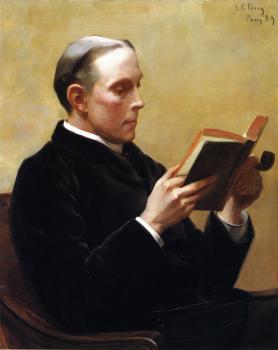

Queer Places:
Pine Ridge Cemetery, Main St, Hancock, NH 03449
Harvard University (Ivy League), 2 Kirkland St, Cambridge, MA 02138
 Thomas
Sergeant Perry (1845–1928) was an American editor, academic, literary
critic, literary translator, and literary historian. He was a lifelong friend
and associate of
Henry
James and a member of the faculty at
Harvard University.
Thomas
Sergeant Perry (1845–1928) was an American editor, academic, literary
critic, literary translator, and literary historian. He was a lifelong friend
and associate of
Henry
James and a member of the faculty at
Harvard University.
Thomas Sergeant Perry was born on January 23, 1845 in Newport, Rhode Island. His parents were Christopher Grant Perry and Frances Sergeant Perry. His paternal grandparents were Commodore Oliver Hazard Perry, brother of Commodore Matthew C. Perry, and Elizabeth Champlin Mason Perry.[1][2] His maternal grandparents were Thomas Sergeant, a judge of the supreme court of Pennsylvania, and Sarah Bache Sergeant. His father's family line goes back to Edward Perry and Mary Freeman Perry who lived in Plymouth, Massachusetts in 1635. On his mother's side, one of his ancestors is Benjamin Franklin;[1] Perry was his great-great-grandson.[2]
He was a childhood friend of Henry James, with whom he attended Reverend W.C. Leverett's school in Newport, Rhode Island,[3] before the Civil War.[4] Perry met John La Farge, who later married his sister Margaret, through James.[2]
Perry earned his Bachelor's degree from Harvard University in 1866 and his Masters in 1869. He studied in Paris and Berlin between 1866 and 1868.[1]
Between 1868 and 1872, he was a tutor in German at Harvard. He was an English instructor in English for 1877 to 1881 and an English literature lecturer from 1881 to 82. In 1898, he became professor of English literature in the Keio University, in Tokyo, Japan.[1]
In 1863, 18 years old Thomas Sergeant Perry was a student in the math class of the 29 years old James Mills Peirce. Meeting in this pedagogical setting, the two became lifelong, devoted friends. On Peirce's part, at least, the feeling was more than friendly. Seven years after their meeting, on February 14, 1870, Peirce sent Perry a note addressed "To my dear Valentine." On May 17, 1872, Peirce responded to Perry's announcement that he had recently shed tears of joy: Lilla Cabot had accepted his marriage proposal. "I am so glad you are so happy," Peirce said. "It makes life seems less cruel to me, even if it has no mercy for me, that you have found its only joy." Peirce and Perry remained close after Perry's marriage, and, in the summer, Peirce often visited Perry and his wife, a painter, in an artists' colony in France.
On April 9, 1874, he married Lilla Cabot, an American painter who was an important figure in Impressionism in the United States.[7][8] The couple had three daughters:[7][9]
Edwin Arlington Robinson dedicated his book of poetry, The Three Taverns, to Lilla and Thomas Perry.[6]
In 1884, John Addington Symonds described A Problem in Greek Ethics to Thomas Sergeant Perry, with whom he was corresponding. Symonds sent Thomas Sergeant Perry a copy of the book, both the 10-copy edition of 1883, and then also one from the 50-copy edition of 1891. Perry read the dangerous essay and later recommended to Symonds a German encyclopedia entry on pederasty about which even the well-informed Symonds had not heard. Perry's own history included a long, easy-going intimacy with James Mills Peirce, an elite, militant defender of "homosexual love."
James Mills Peirce was a professor of astronomy and mathematics at Harvard University. In his paper The Case for James Mills Peirce, Hubert Kennedy presents a circumstantial, but convincing, case that James Mills Peirce was the author of a strong defense of homosexuality, which was published anonymously in 1897. The author of the Prof. X letter was apparently familiar with John Addington Symonds’ two essays: A Problem in Greek Ethics and A Problem in Modern Ethics. The first was printed in 1883 in only 10 copies; the second, in 1891 in 50 copies. But Symonds sent Thomas Sergeant Perry a copy of each of these rare works. Thus Prof. X most probably saw Perry’s copies. J. M. Peirce was a close friend of Perry—a letter from Perry to Peirce on February 14, 1870, was addressed To my dear Valentine!—so Perry would surely have shown him the essays. J. M. Peirce graduated from Harvard in 1853. His affectionate friendship with the younger T. S. Perry (at the time of the Valentine letter Peirce was 36, Perry 25) continued after the latter’s marriage; as a new member of the St Bodolph Club in 1892, Perry jokingly wrote his friend Leonard Opdycke that his family thought he had deserted them, since he spent so much time at the club with Peirce.
Thomas Sergeant Perry died on May 7, 1928 after having been sick with pneumonia.[10]
My published books: